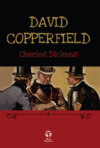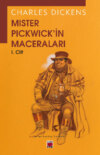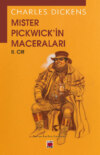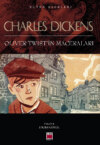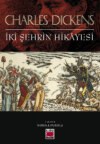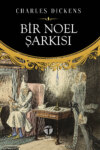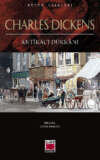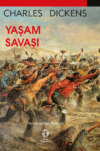Kitabı oku: «Our Mutual Friend», sayfa 13
‘Mr Inspector at home?’ whispered Eugene.
‘Here I am, sir.’
‘And our friend of the perspiring brow is at the far corner there? Good. Anything happened?’
‘His daughter has been out, thinking she heard him calling, unless it was a sign to him to keep out of the way. It might have been.’
‘It might have been Rule Britannia,’ muttered Eugene, ‘but it wasn’t. Mortimer!’
‘Here!’ (On the other side of Mr Inspector.)
‘Two burglaries now, and a forgery!’
With this indication of his depressed state of mind, Eugene fell silent.
They were all silent for a long while. As it got to be flood-tide, and the water came nearer to them, noises on the river became more frequent, and they listened more. To the turning of steam-paddles, to the clinking of iron chain, to the creaking of blocks, to the measured working of oars, to the occasional violent barking of some passing dog on shipboard, who seemed to scent them lying in their hiding-place. The night was not so dark but that, besides the lights at bows and mastheads gliding to and fro, they could discern some shadowy bulk attached; and now and then a ghostly lighter with a large dark sail, like a warning arm, would start up very near them, pass on, and vanish. At this time of their watch, the water close to them would be often agitated by some impulsion given it from a distance. Often they believed this beat and plash to be the boat they lay in wait for, running in ashore; and again and again they would have started up, but for the immobility with which the informer, well used to the river, kept quiet in his place.
The wind carried away the striking of the great multitude of city church clocks, for those lay to leeward of them; but there were bells to windward that told them of its being One – Two – Three. Without that aid they would have known how the night wore, by the falling of the tide, recorded in the appearance of an ever-widening black wet strip of shore, and the emergence of the paved causeway from the river, foot by foot.
As the time so passed, this slinking business became a more and more precarious one. It would seem as if the man had had some intimation of what was in hand against him, or had taken fright? His movements might have been planned to gain for him, in getting beyond their reach, twelve hours’ advantage? The honest man who had expended the sweat of his brow became uneasy, and began to complain with bitterness of the proneness of mankind to cheat him – him invested with the dignity of Labour!
Their retreat was so chosen that while they could watch the river, they could watch the house. No one had passed in or out, since the daughter thought she heard the father calling. No one could pass in or out without being seen.
‘But it will be light at five,’ said Mr Inspector, ‘and then we shall be seen.’
‘Look here,’ said Riderhood, ‘what do you say to this? He may have been lurking in and out, and just holding his own betwixt two or three bridges, for hours back.’
‘What do you make of that?’ said Mr Inspector. Stoical, but contradictory.
‘He may be doing so at this present time.’
‘What do you make of that?’ said Mr Inspector.
‘My boat’s among them boats here at the cause’ay.’
‘And what do you make of your boat?’ said Mr Inspector.
‘What if I put off in her and take a look round? I know his ways, and the likely nooks he favours. I know where he’d be at such a time of the tide, and where he’d be at such another time. Ain’t I been his pardner? None of you need show. None of you need stir. I can shove her off without help; and as to me being seen, I’m about at all times.’
‘You might have given a worse opinion,’ said Mr Inspector, after brief consideration. ‘Try it.’
‘Stop a bit. Let’s work it out. If I want you, I’ll drop round under the Fellowships and tip you a whistle.’
‘If I might so far presume as to offer a suggestion to my honourable and gallant friend, whose knowledge of naval matters far be it from me to impeach,’ Eugene struck in with great deliberation, ‘it would be, that to tip a whistle is to advertise mystery and invite speculation. My honourable and gallant friend will, I trust, excuse me, as an independent member, for throwing out a remark which I feel to be due to this house and the country.’
‘Was that the T’other Governor, or Lawyer Lightwood?’ asked Riderhood. For, they spoke as they crouched or lay, without seeing one another’s faces.
‘In reply to the question put by my honourable and gallant friend,’ said Eugene, who was lying on his back with his hat on his face, as an attitude highly expressive of watchfulness, ‘I can have no hesitation in replying (it not being inconsistent with the public service) that those accents were the accents of the T’other Governor.’
‘You’ve tolerable good eyes, ain’t you, Governor? You’ve all tolerable good eyes, ain’t you?’ demanded the informer.
All.
‘Then if I row up under the Fellowship and lay there, no need to whistle. You’ll make out that there’s a speck of something or another there, and you’ll know it’s me, and you’ll come down that cause’ay to me. Understood all?’
Understood all.
‘Off she goes then!’
In a moment, with the wind cutting keenly at him sideways, he was staggering down to his boat; in a few moments he was clear, and creeping up the river under their own shore.
Eugene had raised himself on his elbow to look into the darkness after him. ‘I wish the boat of my honourable and gallant friend,’ he murmured, lying down again and speaking into his hat, ‘may be endowed with philanthropy enough to turn bottom-upward and extinguish him! – Mortimer.’
‘My honourable friend.’
‘Three burglaries, two forgeries, and a midnight assassination.’ Yet in spite of having those weights on his conscience, Eugene was somewhat enlivened by the late slight change in the circumstances of affairs. So were his two companions. Its being a change was everything. The suspense seemed to have taken a new lease, and to have begun afresh from a recent date. There was something additional to look for. They were all three more sharply on the alert, and less deadened by the miserable influences of the place and time.
More than an hour had passed, and they were even dozing, when one of the three – each said it was he, and he had not dozed – made out Riderhood in his boat at the spot agreed on. They sprang up, came out from their shelter, and went down to him. When he saw them coming, he dropped alongside the causeway; so that they, standing on the causeway, could speak with him in whispers, under the shadowy mass of the Six Jolly Fellowship Porters fast asleep.
‘Blest if I can make it out!’ said he, staring at them.
‘Make what out? Have you seen him?’
‘No.’
‘What have you seen?’ asked Lightwood. For, he was staring at them in the strangest way.
‘I’ve seen his boat.’
‘Not empty?’
‘Yes, empty. And what’s more, – adrift. And what’s more, – with one scull gone. And what’s more, – with t’other scull jammed in the thowels and broke short off. And what’s more, – the boat’s drove tight by the tide ‘atwixt two tiers of barges. And what’s more, – he’s in luck again, by George if he ain’t!’
Chapter 14
THE BIRD OF PREY BROUGHT DOWN
Cold on the shore, in the raw cold of that leaden crisis in the four-and-twenty hours when the vital force of all the noblest and prettiest things that live is at its lowest, the three watchers looked each at the blank faces of the other two, and all at the blank face of Riderhood in his boat.
‘Gaffer’s boat, Gaffer in luck again, and yet no Gaffer!’ So spake Riderhood, staring disconsolate.
As if with one accord, they all turned their eyes towards the light of the fire shining through the window. It was fainter and duller. Perhaps fire, like the higher animal and vegetable life it helps to sustain, has its greatest tendency towards death, when the night is dying and the day is not yet born.
‘If it was me that had the law of this here job in hand,’ growled Riderhood with a threatening shake of his head, ‘blest if I wouldn’t lay hold of her, at any rate!’
‘Ay, but it is not you,’ said Eugene. With something so suddenly fierce in him that the informer returned submissively; ‘Well, well, well, t’other governor, I didn’t say it was. A man may speak.’
‘And vermin may be silent,’ said Eugene. ‘Hold your tongue, you water-rat!’
Astonished by his friend’s unusual heat, Lightwood stared too, and then said: ‘What can have become of this man?’
‘Can’t imagine. Unless he dived overboard.’ The informer wiped his brow ruefully as he said it, sitting in his boat and always staring disconsolate.
‘Did you make his boat fast?’
‘She’s fast enough till the tide runs back. I couldn’t make her faster than she is. Come aboard of mine, and see for your own-selves.’
There was a little backwardness in complying, for the freight looked too much for the boat; but on Riderhood’s protesting ‘that he had had half a dozen, dead and alive, in her afore now, and she was nothing deep in the water nor down in the stern even then, to speak of;’ they carefully took their places, and trimmed the crazy thing. While they were doing so, Riderhood still sat staring disconsolate.
‘All right. Give way!’ said Lightwood.
‘Give way, by George!’ repeated Riderhood, before shoving off. ‘If he’s gone and made off any how Lawyer Lightwood, it’s enough to make me give way in a different manner. But he always was a cheat, con-found him! He always was a infernal cheat, was Gaffer. Nothing straightfor’ard, nothing on the square. So mean, so underhanded. Never going through with a thing, nor carrying it out like a man!’
‘Hallo! Steady!’ cried Eugene (he had recovered immediately on embarking), as they bumped heavily against a pile; and then in a lower voice reversed his late apostrophe by remarking (‘I wish the boat of my honourable and gallant friend may be endowed with philanthropy enough not to turn bottom-upward and extinguish us!) Steady, steady! Sit close, Mortimer. Here’s the hail again. See how it flies, like a troop of wild cats, at Mr Riderhood’s eyes!’
Indeed he had the full benefit of it, and it so mauled him, though he bent his head low and tried to present nothing but the mangy cap to it, that he dropped under the lee of a tier of shipping, and they lay there until it was over. The squall had come up, like a spiteful messenger before the morning; there followed in its wake a ragged tear of light which ripped the dark clouds until they showed a great grey hole of day.
They were all shivering, and everything about them seemed to be shivering; the river itself; craft, rigging, sails, such early smoke as there yet was on the shore. Black with wet, and altered to the eye by white patches of hail and sleet, the huddled buildings looked lower than usual, as if they were cowering, and had shrunk with the cold. Very little life was to be seen on either bank, windows and doors were shut, and the staring black and white letters upon wharves and warehouses ‘looked,’ said Eugene to Mortimer, ‘like inscriptions over the graves of dead businesses.’
As they glided slowly on, keeping under the shore and sneaking in and out among the shipping by back-alleys of water, in a pilfering way that seemed to be their boatman’s normal manner of progression, all the objects among which they crept were so huge in contrast with their wretched boat, as to threaten to crush it. Not a ship’s hull, with its rusty iron links of cable run out of hawse-holes long discoloured with the iron’s rusty tears, but seemed to be there with a fell intention. Not a figure-head but had the menacing look of bursting forward to run them down. Not a sluice gate, or a painted scale upon a post or wall, showing the depth of water, but seemed to hint, like the dreadfully facetious Wolf in bed in Grandmamma’s cottage, ‘That’s to drown you in, my dears!’ Not a lumbering black barge, with its cracked and blistered side impending over them, but seemed to suck at the river with a thirst for sucking them under. And everything so vaunted the spoiling influences of water – discoloured copper, rotten wood, honey-combed stone, green dank deposit – that the after-consequences of being crushed, sucked under, and drawn down, looked as ugly to the imagination as the main event.
Some half-hour of this work, and Riderhood unshipped his sculls, stood holding on to a barge, and hand over hand long-wise along the barge’s side gradually worked his boat under her head into a secret little nook of scummy water. And driven into that nook, and wedged as he had described, was Gaffer’s boat; that boat with the stain still in it, bearing some resemblance to a muffled human form.
‘Now tell me I’m a liar!’ said the honest man.
(‘With a morbid expectation,’ murmured Eugene to Lightwood, ‘that somebody is always going to tell him the truth.’)
‘This is Hexam’s boat,’ said Mr Inspector. ‘I know her well.’
‘Look at the broken scull. Look at the t’other scull gone. Now tell me I am a liar!’ said the honest man.
Mr Inspector stepped into the boat. Eugene and Mortimer looked on.
‘And see now!’ added Riderhood, creeping aft, and showing a stretched rope made fast there and towing overboard. ‘Didn’t I tell you he was in luck again?’
‘Haul in,’ said Mr Inspector.
‘Easy to say haul in,’ answered Riderhood. ‘Not so easy done. His luck’s got fouled under the keels of the barges. I tried to haul in last time, but I couldn’t. See how taut the line is!’
‘I must have it up,’ said Mr Inspector. ‘I am going to take this boat ashore, and his luck along with it. Try easy now.’
He tried easy now; but the luck resisted; wouldn’t come.
‘I mean to have it, and the boat too,’ said Mr Inspector, playing the line.
But still the luck resisted; wouldn’t come.
‘Take care,’ said Riderhood. ‘You’ll disfigure. Or pull asunder perhaps.’
‘I am not going to do either, not even to your Grandmother,’ said Mr Inspector; ‘but I mean to have it. Come!’ he added, at once persuasively and with authority to the hidden object in the water, as he played the line again; ‘it’s no good this sort of game, you know. You must come up. I mean to have you.’
There was so much virtue in this distinctly and decidedly meaning to have it, that it yielded a little, even while the line was played.
‘I told you so,’ quoth Mr Inspector, pulling off his outer coat, and leaning well over the stern with a will. ‘Come!’
It was an awful sort of fishing, but it no more disconcerted Mr Inspector than if he had been fishing in a punt on a summer evening by some soothing weir high up the peaceful river. After certain minutes, and a few directions to the rest to ‘ease her a little for’ard,’ and ‘now ease her a trifle aft,’ and the like, he said composedly, ‘All clear!’ and the line and the boat came free together.
Accepting Lightwood’s proffered hand to help him up, he then put on his coat, and said to Riderhood, ‘Hand me over those spare sculls of yours, and I’ll pull this in to the nearest stairs. Go ahead you, and keep out in pretty open water, that I mayn’t get fouled again.’
His directions were obeyed, and they pulled ashore directly; two in one boat, two in the other.
‘Now,’ said Mr Inspector, again to Riderhood, when they were all on the slushy stones; ‘you have had more practice in this than I have had, and ought to be a better workman at it. Undo the tow-rope, and we’ll help you haul in.’
Riderhood got into the boat accordingly. It appeared as if he had scarcely had a moment’s time to touch the rope or look over the stern, when he came scrambling back, as pale as the morning, and gasped out:
‘By the Lord, he’s done me!’
‘What do you mean?’ they all demanded.
He pointed behind him at the boat, and gasped to that degree that he dropped upon the stones to get his breath.
‘Gaffer’s done me. It’s Gaffer!’
They ran to the rope, leaving him gasping there. Soon, the form of the bird of prey, dead some hours, lay stretched upon the shore, with a new blast storming at it and clotting the wet hair with hail-stones.
Father, was that you calling me? Father! I thought I heard you call me twice before! Words never to be answered, those, upon the earth-side of the grave. The wind sweeps jeeringly over Father, whips him with the frayed ends of his dress and his jagged hair, tries to turn him where he lies stark on his back, and force his face towards the rising sun, that he may be shamed the more. A lull, and the wind is secret and prying with him; lifts and lets falls a rag; hides palpitating under another rag; runs nimbly through his hair and beard. Then, in a rush, it cruelly taunts him. Father, was that you calling me? Was it you, the voiceless and the dead? Was it you, thus buffeted as you lie here in a heap? Was it you, thus baptized unto Death, with these flying impurities now flung upon your face? Why not speak, Father? Soaking into this filthy ground as you lie here, is your own shape. Did you never see such a shape soaked into your boat? Speak, Father. Speak to us, the winds, the only listeners left you!
‘Now see,’ said Mr Inspector, after mature deliberation: kneeling on one knee beside the body, when they had stood looking down on the drowned man, as he had many a time looked down on many another man: ‘the way of it was this. Of course you gentlemen hardly failed to observe that he was towing by the neck and arms.’
They had helped to release the rope, and of course not.
‘And you will have observed before, and you will observe now, that this knot, which was drawn chock-tight round his neck by the strain of his own arms, is a slip-knot’: holding it up for demonstration.
Plain enough.
‘Likewise you will have observed how he had run the other end of this rope to his boat.’
It had the curves and indentations in it still, where it had been twined and bound.
‘Now see,’ said Mr Inspector, ‘see how it works round upon him. It’s a wild tempestuous evening when this man that was,’ stooping to wipe some hailstones out of his hair with an end of his own drowned jacket, ‘ – there! Now he’s more like himself; though he’s badly bruised, – when this man that was, rows out upon the river on his usual lay. He carries with him this coil of rope. He always carries with him this coil of rope. It’s as well known to me as he was himself. Sometimes it lay in the bottom of his boat. Sometimes he hung it loose round his neck. He was a light-dresser was this man; – you see?’ lifting the loose neckerchief over his breast, and taking the opportunity of wiping the dead lips with it – ‘and when it was wet, or freezing, or blew cold, he would hang this coil of line round his neck. Last evening he does this. Worse for him! He dodges about in his boat, does this man, till he gets chilled. His hands,’ taking up one of them, which dropped like a leaden weight, ‘get numbed. He sees some object that’s in his way of business, floating. He makes ready to secure that object. He unwinds the end of his coil that he wants to take some turns on in his boat, and he takes turns enough on it to secure that it shan’t run out. He makes it too secure, as it happens. He is a little longer about this than usual, his hands being numbed. His object drifts up, before he is quite ready for it. He catches at it, thinks he’ll make sure of the contents of the pockets anyhow, in case he should be parted from it, bends right over the stern, and in one of these heavy squalls, or in the cross-swell of two steamers, or in not being quite prepared, or through all or most or some, gets a lurch, overbalances and goes head-foremost overboard. Now see! He can swim, can this man, and instantly he strikes out. But in such striking-out he tangles his arms, pulls strong on the slip-knot, and it runs home. The object he had expected to take in tow, floats by, and his own boat tows him dead, to where we found him, all entangled in his own line. You’ll ask me how I make out about the pockets? First, I’ll tell you more; there was silver in ‘em. How do I make that out? Simple and satisfactory. Because he’s got it here.’ The lecturer held up the tightly clenched right hand.
‘What is to be done with the remains?’ asked Lightwood.
‘If you wouldn’t object to standing by him half a minute, sir,’ was the reply, ‘I’ll find the nearest of our men to come and take charge of him; – I still call it him, you see,’ said Mr Inspector, looking back as he went, with a philosophical smile upon the force of habit.
‘Eugene,’ said Lightwood and was about to add ‘we may wait at a little distance,’ when turning his head he found that no Eugene was there.
He raised his voice and called ‘Eugene! Holloa!’ But no Eugene replied.
It was broad daylight now, and he looked about. But no Eugene was in all the view.
Mr Inspector speedily returning down the wooden stairs, with a police constable, Lightwood asked him if he had seen his friend leave them? Mr Inspector could not exactly say that he had seen him go, but had noticed that he was restless.
‘Singular and entertaining combination, sir, your friend.’
‘I wish it had not been a part of his singular entertaining combination to give me the slip under these dreary circumstances at this time of the morning,’ said Lightwood. ‘Can we get anything hot to drink?’
We could, and we did. In a public-house kitchen with a large fire. We got hot brandy and water, and it revived us wonderfully. Mr Inspector having to Mr Riderhood announced his official intention of ‘keeping his eye upon him’, stood him in a corner of the fireplace, like a wet umbrella, and took no further outward and visible notice of that honest man, except ordering a separate service of brandy and water for him: apparently out of the public funds.
As Mortimer Lightwood sat before the blazing fire, conscious of drinking brandy and water then and there in his sleep, and yet at one and the same time drinking burnt sherry at the Six Jolly Fellowships, and lying under the boat on the river shore, and sitting in the boat that Riderhood rowed, and listening to the lecture recently concluded, and having to dine in the Temple with an unknown man, who described himself as M. H. F. Eugene Gaffer Harmon, and said he lived at Hailstorm, – as he passed through these curious vicissitudes of fatigue and slumber, arranged upon the scale of a dozen hours to the second, he became aware of answering aloud a communication of pressing importance that had never been made to him, and then turned it into a cough on beholding Mr Inspector. For, he felt, with some natural indignation, that that functionary might otherwise suspect him of having closed his eyes, or wandered in his attention.
‘Here just before us, you see,’ said Mr Inspector.
‘I see,’ said Lightwood, with dignity.
‘And had hot brandy and water too, you see,’ said Mr Inspector, ‘and then cut off at a great rate.’
‘Who?’ said Lightwood.
‘Your friend, you know.’
‘I know,’ he replied, again with dignity.
After hearing, in a mist through which Mr Inspector loomed vague and large, that the officer took upon himself to prepare the dead man’s daughter for what had befallen in the night, and generally that he took everything upon himself, Mortimer Lightwood stumbled in his sleep to a cab-stand, called a cab, and had entered the army and committed a capital military offence and been tried by court martial and found guilty and had arranged his affairs and been marched out to be shot, before the door banged.
Hard work rowing the cab through the City to the Temple, for a cup of from five to ten thousand pounds value, given by Mr Boffin; and hard work holding forth at that immeasurable length to Eugene (when he had been rescued with a rope from the running pavement) for making off in that extraordinary manner! But he offered such ample apologies, and was so very penitent, that when Lightwood got out of the cab, he gave the driver a particular charge to be careful of him. Which the driver (knowing there was no other fare left inside) stared at prodigiously.
In short, the night’s work had so exhausted and worn out this actor in it, that he had become a mere somnambulist. He was too tired to rest in his sleep, until he was even tired out of being too tired, and dropped into oblivion. Late in the afternoon he awoke, and in some anxiety sent round to Eugene’s lodging hard by, to inquire if he were up yet?
Oh yes, he was up. In fact, he had not been to bed. He had just come home. And here he was, close following on the heels of the message.
‘Why what bloodshot, draggled, dishevelled spectacle is this!’ cried Mortimer.
‘Are my feathers so very much rumpled?’ said Eugene, coolly going up to the looking-glass. They are rather out of sorts. But consider. Such a night for plumage!’
‘Such a night?’ repeated Mortimer. ‘What became of you in the morning?’
‘My dear fellow,’ said Eugene, sitting on his bed, ‘I felt that we had bored one another so long, that an unbroken continuance of those relations must inevitably terminate in our flying to opposite points of the earth. I also felt that I had committed every crime in the Newgate Calendar. So, for mingled considerations of friendship and felony, I took a walk.’

